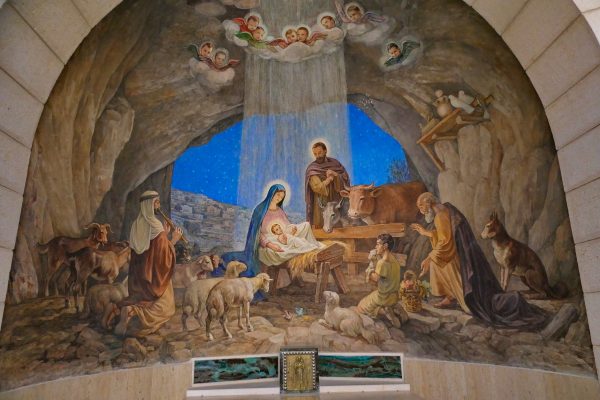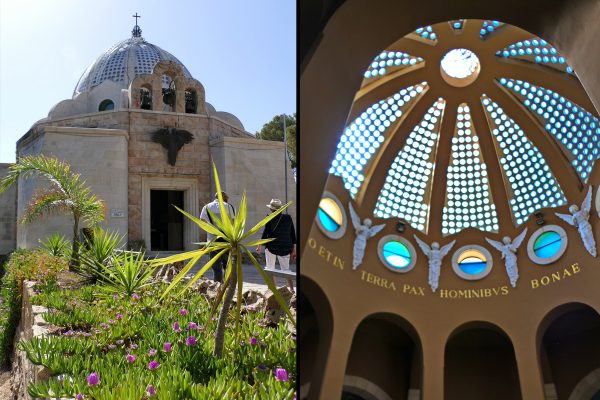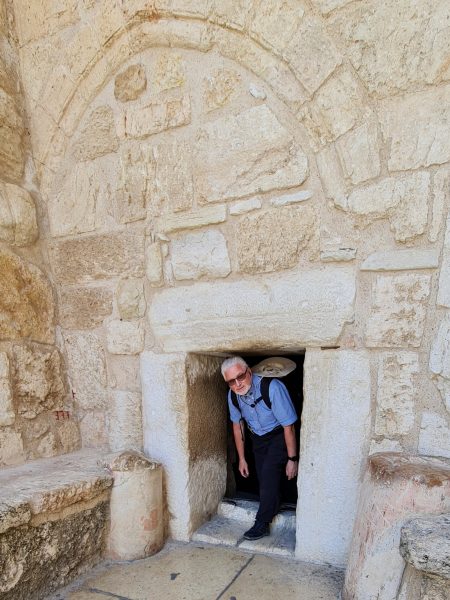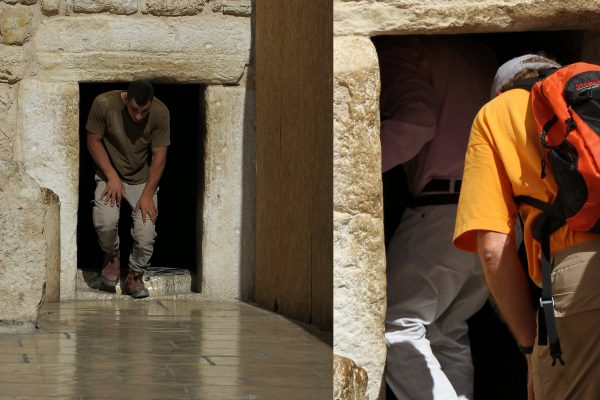
Diese Darstellung der Geburt Jesu in Bethlehem* ist, wie so viele, ziemlich verklärt. Ich finde es schön, wie aufmerksam die vielen Tiere (z. B. der Hund rechts) die Szene beobachten. Auch die Gaben der Hirten gefallen mir: ein Lämmlein, ein Obstkorb, ein Flötenstück. Die Wirklichkeit hat bestimmt nicht so verträumt ausgesehen. Warum, beschreibt Markus Spieker sehr fein: „Der Weg ins menschliche Leben führt nicht über rote Teppiche. Gott schlüpft durch die Hintertür in seine Schöpfung. Er erscheint nicht als Supermann auf der großen Bühne des Forum Romanum oder wenigsten auf dem Marktplatz von Alexandria, Athen oder Antiochia. Er kommt als kreischender Kleine-Leute-Säugling in einem Tierstall zur Welt.“**
- Dass Gott als kleines Kind in unsere Welt gekommen ist, ist unser Glück, denn anders hätten wir seine Größe und Herrlichkeit nicht überlebt.
- Dass dieses Kind als Erwachsener heilte, predigte und durch sein Wirken zeigte, wie Gott wirklich ist, darauf gründet sich unser Glaube.
- Dass Jesus am Kreuz unschuldig für alle Menschen starb, also auch für mich, das ist unsere Rettung.
- Dass er nicht im Grab blieb, sondern auferstanden ist, garantiert uns: Der Tod hat nicht das letzte Wort.
- Dass er versprochen hat, wiederzukommen und seine Kinder zu sich zu holen, das ist Hoffnung und Gewissheit zugleich. Darauf lohnt es sich zu warten, dafür lohnt es sich zu leben.

* Das ist eines von mehreren Gemälden in der Franziskaner-Kapelle („Engelskapelle“) auf einem der Hirtenfelder in Bait Sahur, östlich von Bethlehem. Die Form erinnert an die Kirche Dominus Flevit am Ölberg in Jerusalem, was nicht verwundert, denn beide wurden von Antonio Barluzzi gebaut (die hier 1954).
Der Text an der Kuppel (auf dem Foto nur teilweise zu sehen) lautet: GLORIA IN EXCELSIS DEO ET IN TERRA PAX HOMINIBVS BONAE VOLUNTATIS, was dem Lukasevangelium 2,14 nach der Vulgata (lateinische Übersetzung der Bibel) entnommen ist und so viel bedeutet wie „Ehre sei Gott in der Höhe und Friede auf Erden den Menschen seiner Gnade bzw. seines Wohlgefallens“. In der Neuen Genfer Übersetzung, die – wie heute die meisten Bibelübersetzungen – auf den griechischen Grundtext zurückgreift, lautet der Satz: „… und Frieden auf der Erde für die Menschen, auf denen sein Wohlgefallen ruht“.
** Markus Spieker, JESUS. Eine Weltgeschichte, Fontis-Verlag Basel, 2020, S. 200. Sehr empfehlenswert!! Rezension hier
![]()
No red carpet, no superman
This illustration of the birth of Jesus in the shepherds’ fields of Bethlehem is, like so many, quite romanticised. I love how attentively the many animals (e.g. the dog on the right) observe the scene. I also like the shepherds’ gifts: a little lamb, a basket of fruit, a piece of music with the flute. Reality certainly did not look so dreamy. Markus Spieker describes why: “The way into human life does not lead across red carpets. God slips into his creation through the back door. He does not appear as superman on the big stage of the Roman Forum or at least on the marketplace of Alexandria, Athens or Antioch. He comes into the world as a shrieking little people’s infant in an animal pen.” Markus Spieker, JESUS. Eine Weltgeschichte, Fontis-Verlag Basel, 2020, p. 200
- That God came into our world as a little child is our good fortune, for otherwise we would not have survived his greatness and glory.
- That this child as an adult healed, preached and showed through his work what God is really like, that is the basis of our faith.
- That Jesus died innocently on the cross for all humans, so also for me, that is our salvation.
- That he did not remain in the grave, but rose again, guarantees us: death does not have the last word.
- The fact that he promised to come back and take his children to himself is both hope and certainty.
That all is worth waiting for his return, that all is worth living for.
![]()
Ni alfombra roja, ni superman
Este cuadro del nacimiento de Jesús en los campos de pastores de Belén es, como tantos otros, bastante embellecido. Me encanta lo atentos que observan los animales la escena (por ejemplo, el perro de la derecha). También me gustan los regalos de los pastores: un corderito, una cesta de fruta, una pieza musical con la flauta. La realidad, desde luego, no fue tan romántica. Markus Spieker describe el porqué: “El camino hacia la humanidad no condujo por alfombras rojas. Dios se coló en su creación por la puerta de atrás. No aparece como supermán en el gran escenario del Foro Romano o, al menos, en la plaza mayor de Alejandría, Atenas o Antioquía. Viene al mundo como un bebé llorón en un corral de animales.” Markus Spieker, JESUS. Eine Weltgeschichte, Fontis-Verlag Basel, 2020, p. 200
- Que Dios viniera a nuestro mundo como un niño pequeño es nuestra buena suerte, pues de otro modo no habríamos sobrevivido a su grandeza y gloria.
- Que este niño de adulto curara, predicara y mostrara con su obra cómo es Dios en realidad, ésa es la base de nuestra fe.
- Que Jesús murió inocentemente en la cruz por todas las personas, incluida yo, ésa es nuestra salvación.
- Que no permaneciera en la tumba, sino que resucitara, nos garantiza que la muerte no tiene la última palabra.
- El hecho de que prometiera volver y llevarse a quienes creen en él a su hogar es tanto una esperanza como una certeza.
Por todo esto merece la pena esperar su regreso, por todo esto merece la pena seguir viviendo y luchando.



